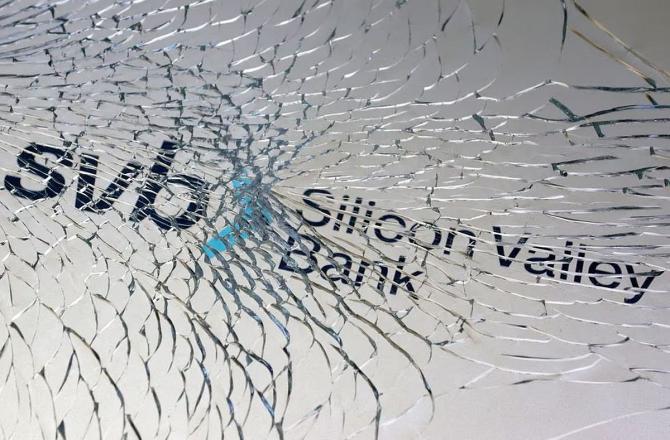Indian start-ups raised issues, such as blockages in international wire transfers, disruptions due to threshold limits on withdrawals, lack of communication from US agencies, and the need for preferential access to credit, in a meeting with the government over the fallout of Silicon Valley Bank’s collapse.

Rajeev Chandrasekhar, minister of state for electronics and information technology, held a virtual meeting with over 450 members from start-ups, venture capitalists, and investors who have been directly affected by the closure of SVB.
He assured them that the IT ministry would put together a list of suggestions and give it to the finance minister on behalf of start-ups.
According to sources, the minister asked the stakeholders about what needs to be done so that they move their banking operations to Indian banks or international banks having a presence in Gujarat International Finance Tec-City (GIFT City) IFSC.
In reply, they suggested measures like newer credit products for start-ups.
Most stakeholders present in the meeting have already withdrawn their deposits from SVB since Monday morning, but they cannot bring deposits to the country because of blocked international wires, Business Standard has learnt.
“Founders need both psychological support and concrete action from the government on a bilateral basis to unlock this.
"We are looking for a government-led evacuation programme so that the founders can get their money back either to the country or to some other location where they have a banking relationship,” said a partner at a venture capital firm during the meeting.
She complained there was “tremendous opacity” and “non-disclosure” in terms of what was going on in the bank after the news of the closure.
Another stakeholder said there could be a major concern about the requirement of working capital and thus, the government should consider preferential access to credit either by India’s domestic banking system or other mechanisms to tide over the next three months.
“We don’t know how long the recoveries and assets sell will take on the US side and what will be the trickle-down effects on the depositors,” she added.
Sources said many start-ups which had deposits in SVB have shared worries about possible burdens due to compliance checks and taxes to be applied while bringing the money to India.
“All our money was in SVB. Thankfully, we got access to a big part of it just a few hours back.
"What worry me today are compliance issues and tax implications, which are so hard to understand.
"I have gone to the point of exploring hiring one of the Big Four just to understand how I can bring money to India safely,” said a start-up founder in the meeting.
A partner at a leading Mumbai-based venture capital firm said: “During the past few days, we had over a dozen of our portfolio companies affected significantly due to the challenges at SVB.
"Many of the companies opening accounts overseas have their front-end in Silicon Valley and back-end in Bengaluru or NCR. It has been a standard practice for convenience.”
“Many of us here do believe that (opening accounts at the IFSC) is a viable option.
"We would like a little more action and awareness on comfort building for IFSC as a jurisdiction so that there are the same relaying messages around multiple stakeholders.
"Otherwise, a few of us become lone voices.”
The minister said the immediate priority was to tide over the crisis, avoiding any impact on growth of the affected start-ups.
He told such companies to consider the processing time as a transition period until solutions are finalised.
“If you have to rely on the banking system, I would strongly suggest that you look at the Indian banking system because, certainly, this is the most robust and stable.
"My suggestion strongly is to explore this. There has been a natural incentive to use foreign-domiciled banks.
"I certainly think that we must figure out a way of getting you to use the Indian banking system, without changing the business model,” Chandrasekhar added.
One of the entrepreneurs who is aware of the discussions during the meeting is Anil Agarwal, CEO and co-founder of InCruiter, a tech firm which provides remote interview solutions for businesses.
Agarwal said that lack of credit options and accessibility to adequate funds have always been significant pain points for startups, hindering their growth even if they have the potential.
“In this context, it’s really heartening to see the government exploring new avenues to support entrepreneurs,” said Agarwal.
“Initiatives like enabling US funds to transfer to Indian banks and launching deposit-backed credit lines will be game-changing for these young visionaries, providing them with the much-needed financial boost to their entrepreneurial journeys and helping them thrive in today’s highly competitive business landscape."
“The usefulness of a credit line based on deposits is limited for startups.
"Collaborating more closely with revenue-generating startups in the US could be a valuable strategy for Indian banks,” said Vijay Yalamanchili, CEO of Keka, an HR tech firm based out of Hyderabad, after coming to know about the discussion with Chandrasekhar.
Experts said that Silicon Valley Bank was one of the major US financial institutions which held monetary transactions with numerous Indian startups and enterprises.
“Due to the fact that SVB's top clients were SaaS and IT unicorns, the recent developments have alerted the Indian investment and startup sector,” said Prateek Toshniwal, a serial investor, financial advisor and co-founder of IVY Growth Associates, MI Capital.
As of December 2022, Silicon Valley Bank had approximately $175.4 billion in total deposits and $209 billion in total assets.
As per the recent data furnished by Tracxn, SVB had made investments in approximately 21 startup companies in India.
One of the vital investments that SVB made in the Indian startup ecosystem was worth $150 million which consisted of a revolving credit facility and convertible financing.
As SVB announced it had sold $21 billion worth of securities and was getting ready to sell $1.75 billion worth of shares to strengthen its finances, challenges started to stir.
Federal Deposit Insurance Corporation (FIDC), a US regulatory authority, has announced that it will pay depositors an advance dividend within the next week, with additional payments to follow as asset sales take place.
The FDIC has insisted that it has moved all deposits from the SVB, which focuses on startups, to a newly established bridge bank and that all depositors will have access to their money as a result.
“Since the US government is helping depositors, the Indian startup and venture capital ecosystem may continue to have faith in the US banking sector,” said Toshniwal.
“Though the SVB closure has impacted the Indian startup and fiscal ecosystem to an extent, the enterprises are reviving due to the effective framework of regulations laid by the Indian government.”












 © 2025
© 2025